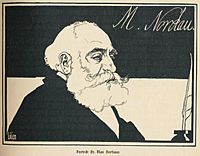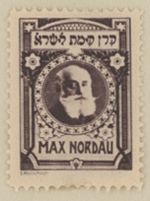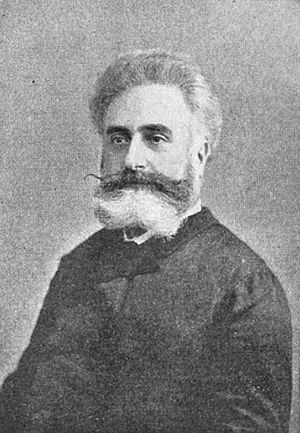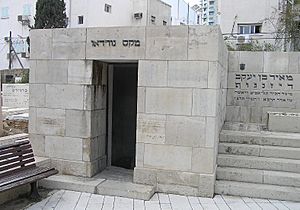Max Nordau facts for kids
Quick facts for kids
Max S. Nordau
|
|
|---|---|
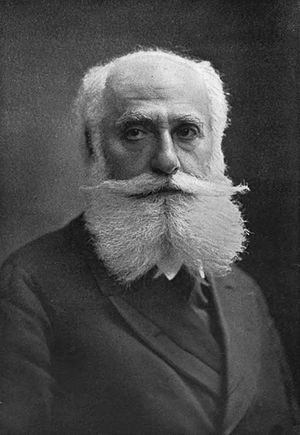 |
|
| Born |
Simon Maximilian (Simcha) Südfeld
29 July 1849 |
| Died | 23 January 1923 (aged 73) Paris, France
|
| Occupation | Physician, author, social critic |
| Known for | Co-founder of World Zionist Organization |
|
Notable work
|
Degeneration |
| Signature | |
 |
|
Max Simon Nordau (born Simon Maximilian Südfeld; 29 July 1849 – 23 January 1923) was an important Zionist leader, a physician (doctor), an author, and a social critic. A social critic is someone who writes about problems in society.
He helped start the Zionist Organization with Theodor Herzl. He also served as president or vice-president for several Zionist meetings called congresses.
As a social critic, he wrote books like The Conventional Lies of Our Civilisation (1883) and Degeneration (1892). Even though Degeneration wasn't his most popular book when he was alive, it is the one people remember and talk about most today.
Contents
About Max Nordau
Simon Maximilian Südfeld, who later became Max Nordau, was born in Pest, which was then part of the Kingdom of Hungary. His father, Gabriel Südfeld, was a rabbi (a Jewish religious leader). He also taught Hebrew.
Nordau went to a Jewish elementary school. He later earned a medical degree from the University of Pest in 1872. After finishing his studies, he traveled around Europe for six years. He changed his name to Max Nordau before moving to Berlin in 1873.
In 1878, he started working as a doctor in Budapest. In 1880, he moved to Paris, France. He worked in Paris as a writer for a newspaper called Die Neue Freie Presse. He lived most of his life in Paris.
Before going to university, he started writing for newspapers in Budapest. He wrote about plays and later became a writer and reporter for other newspapers. His newspaper articles were later put together to create his first books.
Nordau grew up in a religious Jewish family. However, as an adult, he was an agnostic. This means he believed it was impossible to know if God exists. He married a Christian woman from Denmark. Even though he was from Hungary, he felt connected to German culture. He once wrote that after age fifteen, he felt "as a German and as a German only." Max Nordau was the father of a painter named Maxa Nordau (1897–1993).
Why Nordau Became a Zionist
Nordau became a Zionist because of an event called the Dreyfus Affair. This was a big scandal in France where a Jewish army officer was wrongly accused of being a spy. Many Jews, including Theodor Herzl, saw this event as proof that antisemitism (hatred of Jews) was widespread.
Nordau played a very important part in the World Zionist Organization. His fame helped bring attention to the Zionist movement. He also helped make the organization more democratic, meaning it was run by elected representatives.
In 1903, a student tried to shoot Nordau during a Hannukah celebration in Paris. Nordau was not seriously hurt.
When World War I started, Nordau was accused of supporting Germany because he was from Hungary. He denied this and moved to Madrid, Spain, for a while.
Zionism and Jewish Identity
The Dreyfus Affair and Its Impact
The Dreyfus affair was a key event that led many Western European Jews, including Nordau, to become Zionists. Theodor Herzl also saw the Dreyfus affair as proof that a Jewish homeland was needed. Herzl realized that antisemitism was a problem everywhere. Nordau also saw crowds in Paris shouting "death to the Jews!" during the affair.
Nordau became a close friend and advisor to Herzl in Paris. The fact that such hatred appeared in France was very important. France was seen as a modern, enlightened country that had given Europe ideas of freedom and equality.
The Idea of "Muscular Judaism"
At the Zionist Congress in 1898, Nordau created the term "muscular Judaism" (Muskeljudentum). This idea encouraged Jewish people to be strong, disciplined, and physically fit. He wanted to change the old idea of Jews as weak and only focused on books. He believed that being physically strong would help Jews become more confident. He wrote more about this idea in a Jewish gymnastics magazine in 1900.
World Zionist Congress
Nordau was very important to the Zionist Congresses. These meetings helped shape what Zionism would become. Herzl first thought about having a Jewish newspaper and a small group of leaders to spread Zionist ideas. But Nordau believed that Zionism needed to look democratic. He convinced Herzl that a large assembly was necessary. This democratic appearance helped show that Zionists represented many Jewish people.
There were eleven such Congresses in total. Nordau helped organize the first one in Basle, Switzerland, from August 29-31, 1897. His fame as a smart writer helped bring attention to the project. Many people were surprised to learn that Max Nordau, the famous writer, was Jewish.
Herzl gave the first speech at the Congress. Nordau spoke next, describing the difficult situation of Jewish people in Eastern Europe. He used facts and numbers to show how bad things were. He also shared his belief that Jewish people should have their own democratic nation-state.
Nordau's speeches at the World Zionist Congress challenged old ideas about Jewish people. He argued against the stereotype of Jews as only merchants or business people. He said that many modern financial ideas, like insurance, were invented by non-Jews. He believed Jewish people had a special talent for politics. He felt they could not fully use this talent without their own country. While Herzl wanted an elite group to make decisions, Nordau insisted that the Congress should be democratic and vote on important issues.
At the Sixth Zionist Congress, Nordau had to explain and defend the Uganda Scheme. This was a proposal for a temporary Jewish homeland in East Africa.
Nordau passed away in Paris, France in 1923.
Degeneration (1892)
Nordau's main work, Entartung (which means Degeneration), was a strong criticism of what he thought was "sick" or "bad" art. It also criticized the effects of new social changes, like cities growing very fast. He believed these changes were harming people.
In his book, Nordau attacked many art styles and artists of his time. He believed that society was facing a serious "epidemic" of decline and stress. He called on leaders like judges, teachers, and politicians to protect civilization. He thought they should organize ways to stop and control art and ideas he saw as harmful.
The famous American philosopher William James mentioned Nordau's book. James joked about Nordau's "bulky book" because Nordau tried to say that many works of genius were bad just because he didn't like them.
Commemoration
In 1926, Nordau's body was moved to Tel Aviv's Trumpeldor Cemetery in Israel. A major street in Tel Aviv is named Nordau Boulevard in his honor.
Published works
- Pariser Studien und Bilder (Paris studies and sketches, 1878)
- Seifenblasen (Soap bubbles, 1879)
- Vom Kreml zur Alhambra (From the Kremlin to the Alhambra, 1880)
- Paris unter der dritten Republik (Paris under the Third Republic, 1881)
- Der Krieg der Millionen, a drama (The war of the millions, 1882)
- Die konventionelle Lügen der Kulturmenschheit (Conventional Lies of Society, 1883)
- Paradoxe (Paradoxes, 1885)
- Die Krankheit des Jahrhunderts (The Malady of the Century, 1887)
- Gefühlskomödie, a novel (A Comedy of Sentiment, 1891)
- Entartung (Degeneration, 1892)
- Seelen Analysen (Analysis of souls, 1892)
- Das Recht zu lieben, a drama (The right to live, 1893)
- Die Kugel, a drama (The ball, 1894)
- Die Drohnenschlacht (Battle of the drones, 1897)
- Dr. Kuhn, a drama (1898)
- The Drones Must Die (1899)
- Zeitgenossiche Franzosen (Contemporary French people, 1901)
- Morganatic (1904)
- On Art and Artists (1907)
- Die Sinn der Geschichte (The sense of history, 1909)
- Zionistische Schriften (Zionist writings, 1909)
- Mörchen (Crumbs of ruins, 1910)
- Der Lebenssport (The sport of life, 1912)
See also
 In Spanish: Max Nordau para niños
In Spanish: Max Nordau para niños
- Gustave Le Bon
- Ruben Brainin
- Israel Zangwill
- Basel Program
 | Delilah Pierce |
 | Gordon Parks |
 | Augusta Savage |
 | Charles Ethan Porter |


